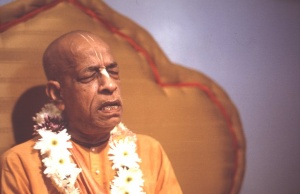SB 4.2.22

A.C. Bhaktivedanta Swami Prabhupada
TEXT 22
- gṛheṣu kūṭa-dharmeṣu
- sakto grāmya-sukhecchayā
- karma-tantraṁ vitanute
- veda-vāda-vipanna-dhīḥ
SYNONYMS
gṛheṣu—in householder life; kūṭa-dharmeṣu—of pretentious religiosity; saktaḥ—being attracted; grāmya-sukha-icchayā—by desire for material happiness; karma-tantram—fruitive activities; vitanute—he performs; veda-vāda—by the explanations of the Vedas; vipanna-dhīḥ—intelligence being lost.
TRANSLATION
Pretentiously religious householder life, in which one is attracted to material happiness and thus also attracted to the superficial explanation of the Vedas, robs one of all intelligence and attaches one to fruitive activities as all in all.
PURPORT
Persons who identify with bodily existence are attached to the fruitive activities described in the Vedic literature. For example, in the Vedas it is said that one who observes the cāturmāsya vow will attain eternal happiness in the heavenly kingdom. In Bhagavad-gītā, it is said that this flowery language of the Vedas mostly attracts persons who identify with the body. To them such happiness as that of the heavenly kingdom is everything; they do not know that beyond that is the spiritual kingdom, or kingdom of God, and they have no knowledge that one can go there. Thus they are bereft of transcendental knowledge. Such persons are very careful in observing the rules and regulations of household life in order to be promoted in the next life to the moon or other heavenly planets. It is stated here that such persons are attached to grāmya-sukha, which means "material happiness," without knowledge of eternal, blissful spiritual life.